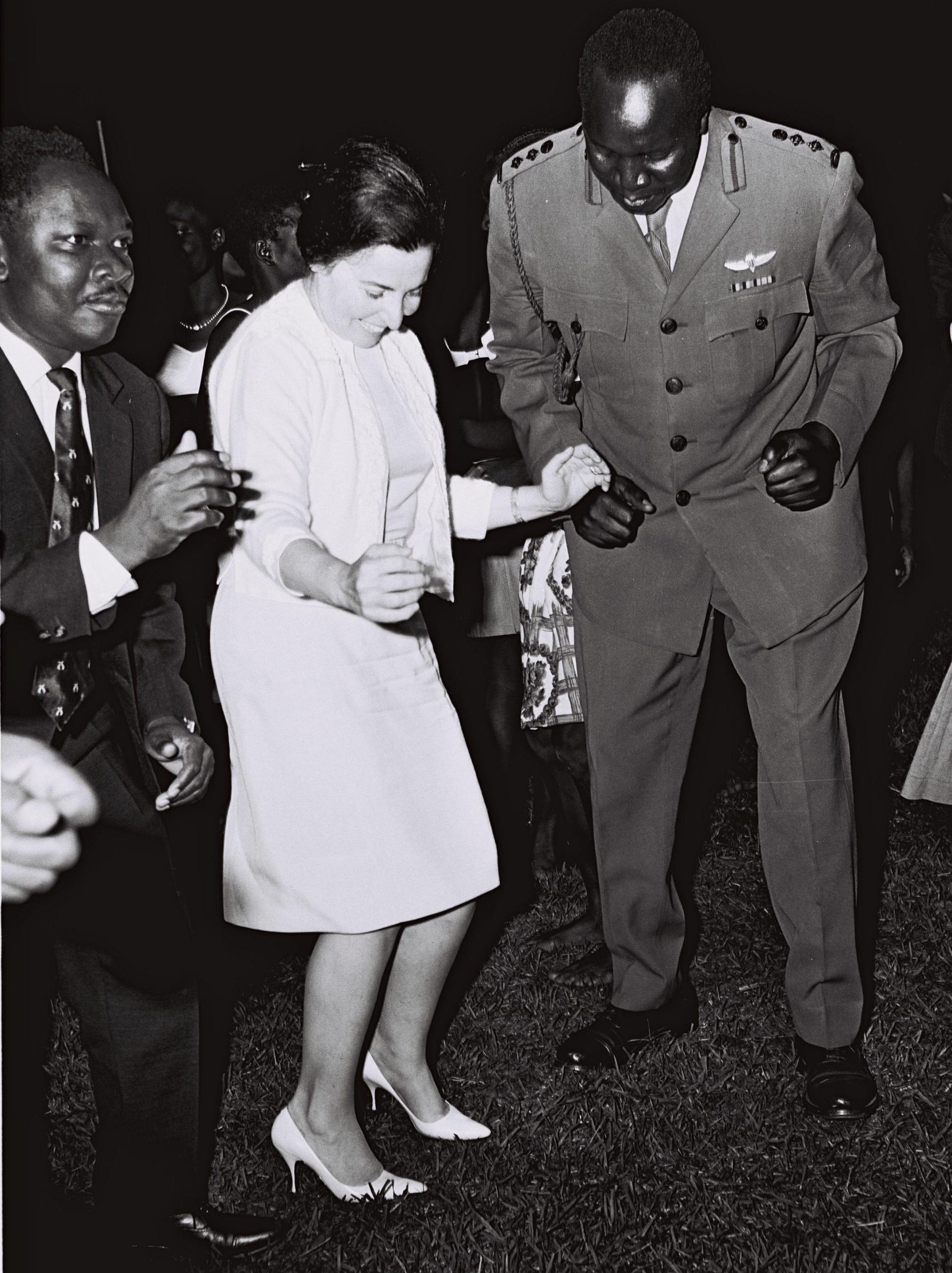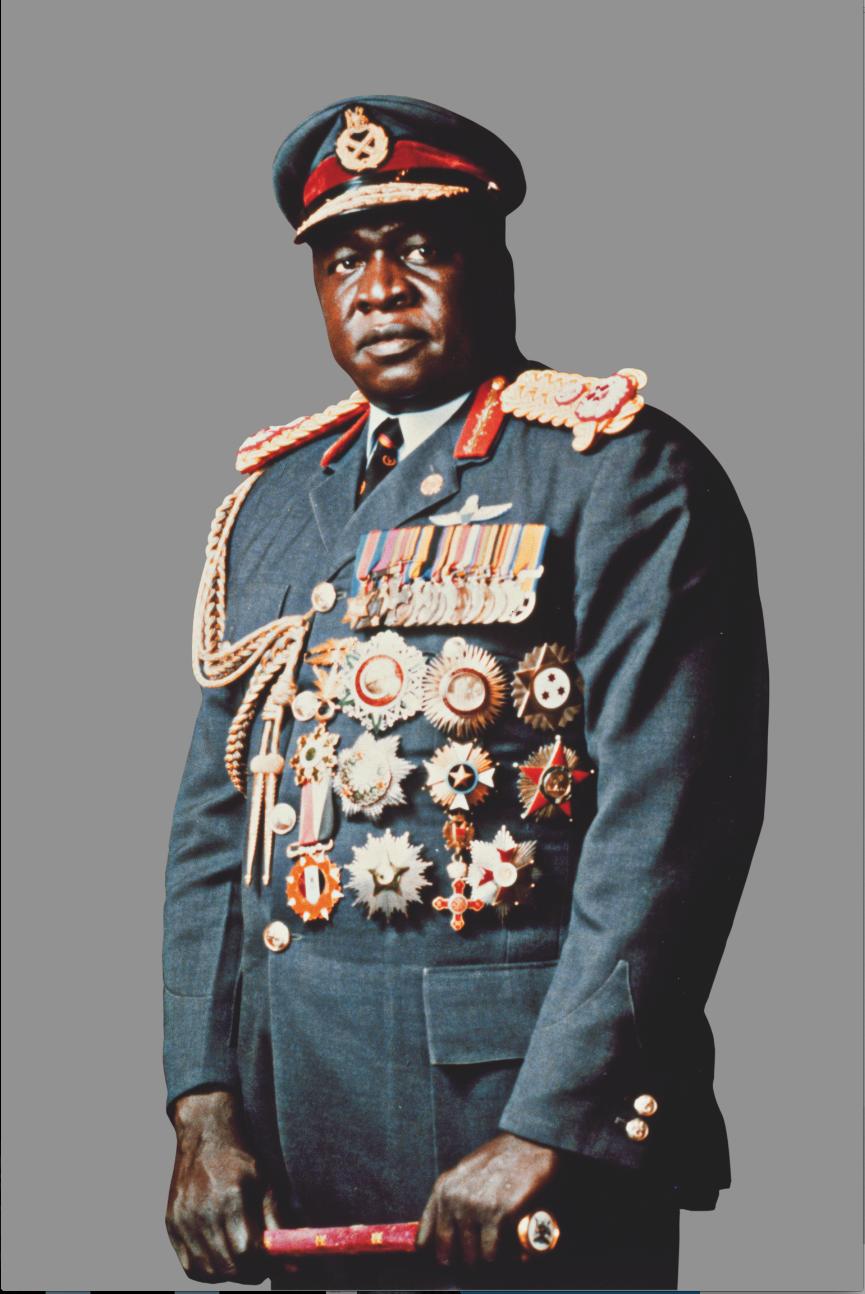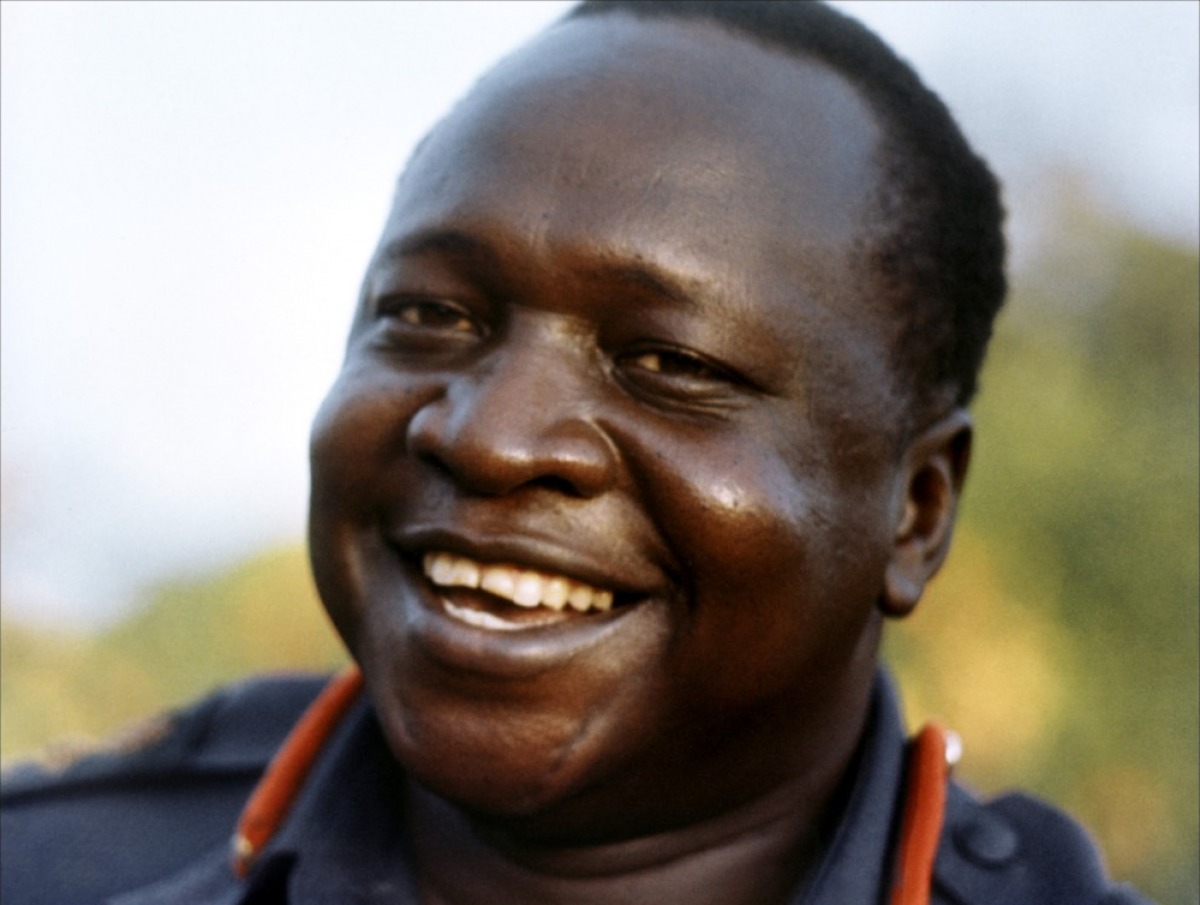Idi Amin's Spouse: The term "Idi Amin spouse" refers to the wives of former Ugandan dictator Idi Amin. For example, Sarah Kyolaba was Amin's fourth wife.
Understanding the personal lives of historical figures can provide insights into their character and motivations. In Amin's case, his marital relationships played a significant role in his rise and fall from power.
This article will examine Amin's various spouses, their backgrounds, and their influence on his political career.
- Unveiling The Phenomenon Fraser Clarke Heston A Rising Star In The Spotlight
- Sarah Joe Pender The Rising Star Shaping The Future Of Entertainment
Idi Amin Spouse
Understanding various aspects related to Idi Amin's spouses is crucial for a comprehensive analysis of his personal life and its impact on his political career.
- Background: Family history, education, social status
- Influence: Role in decision-making, political support
- Relationships: Dynamics with Amin, impact on family life
- Marriages: Number of wives, ceremonies, legal status
- Children: Number of children, their upbringing and education
- Public Image: Perception of Amin's spouses by the public
- Cultural Context: Polygamy in Ugandan society
- Historical Significance: Impact on Amin's regime and legacy
- Modern Relevance: Implications for understanding gender roles and power dynamics
- Research Opportunities: Potential areas for further study
These aspects provide a multifaceted perspective on Idi Amin's spouses, shedding light on their personal lives, their influence on his political career, and the cultural and historical context surrounding their relationships.
### Personal Details and Bio Data of Idi Amin| Attribute | Detail ||---|---|| Full Name | Idi Amin Dada || Date of Birth | c. 1925 || Place of Birth | Koboko, Uganda || Date of Death | 16 August 2003 || Place of Death | Jeddah, Saudi Arabia || Occupation | Military officer, politician || Years in Power | 19711979 || Number of Wives | 5 || Number of Children | 45+ |
Background
Understanding the family history, education, and social status of Idi Amin's spouses provides insights into their backgrounds and the dynamics of their relationships with him. These factors influenced their roles within his regime and shaped their public image.
- Cone Health Mychart Your Ultimate Guide To Managing Health Records
- Unpacking The Xhqmster Phenomenon What You Need To Know
- Family Lineage: Amin's wives came from diverse family backgrounds, including royalty, military families, and prominent political figures. For example, his fourth wife, Sarah Kyolaba, was the daughter of a Ugandan cabinet minister.
- Education Level: The educational attainment of Amin's spouses varied, ranging from primary school to university degrees. Some, like Kyolaba, had received higher education, while others had limited formal schooling.
- Social Status: The social status of Amin's wives reflected their family backgrounds and their own accomplishments. They came from both elite and humble beginnings, and their marriages to Amin elevated their social standing.
- Cultural Traditions: The cultural traditions of Uganda, including polygamy and the role of women in society, influenced the family dynamics and social status of Amin's spouses.
Examining the backgrounds of Amin's spouses offers a nuanced understanding of the personal and political factors that shaped their lives and their impact on his regime.
Influence
Amin's spouses played a significant role in his decision-making and provided crucial political support throughout his regime. Their influence stemmed from their close personal relationships with Amin and their understanding of Ugandan politics and culture.
For instance, Amin's fourth wife, Sarah Kyolaba, was known for her intelligence and political acumen. She frequently advised Amin on political matters and played a key role in shaping his policies. Additionally, Amin's wives often acted as intermediaries between him and various factions within the Ugandan government and society.
The influence of Amin's spouses extended beyond political decision-making. They also provided emotional support and stability to Amin, who relied heavily on their counsel and companionship. In return, Amin bestowed upon his wives positions of power and privilege, further solidifying their influence within his regime.
Understanding the role of Amin's spouses in decision-making and political support is essential for comprehending the dynamics of his regime. Their influence highlights the importance of personal relationships and the role of women in Ugandan politics.
Relationships
The dynamics between Idi Amin and his spouses had a profound impact on his family life. Amin's numerous marriages and relationships often resulted in complex and strained family relationships, both within his immediate family and among his extended family members.
For instance, Amin's marriage to Sarah Kyolaba, his fourth wife, caused significant tension within his family. Kyolaba was a strong and independent woman who frequently challenged Amin's authority, leading to conflicts and power struggles. These conflicts had a ripple effect on Amin's other wives and children, creating a climate of fear and insecurity within the family.
Furthermore, Amin's relationships with his spouses were often transactional, based on power and control rather than mutual respect and affection. This transactional nature had a negative impact on his children, who often witnessed the manipulation and abuse within their family.
Understanding the dynamics between Idi Amin and his spouses provides insights into the complexities of family life under authoritarian rule. It highlights the challenges faced by family members in such regimes and the ways in which personal relationships can be used as tools of control and manipulation.
Marriages
Understanding the intricacies of Idi Amin's marriages, including the number of wives, ceremonies, and legal status, sheds light on the cultural and political context of his regime. These aspects provide insights into the power dynamics within his family and his relationship with Ugandan society.
- Number of Wives: Amin married multiple times, with estimates ranging from five to eleven wives. This practice of polygamy was common in Ugandan society at the time and reflected Amin's status and power.
- Ceremonies: Amin's marriages were often lavish and public affairs, demonstrating his wealth and authority. These ceremonies served as political events, solidifying alliances and projecting an image of stability and prosperity.
- Legal Status: The legal status of Amin's marriages varied, with some being legally recognized and others not. This ambiguity allowed Amin to maintain control over his wives and their children, as well as to dissolve marriages at will.
Examining the number of wives, ceremonies, and legal status in Amin's marriages reveals the complex interplay between personal relationships, cultural traditions, and political power. It highlights the ways in which Amin manipulated these aspects to maintain his grip on Uganda and project an image of strength and stability.
Children
The aspect of "Children: Number of children, their upbringing, and education" is crucial in understanding the personal and political dynamics of "idi amin spouse." It encompasses various facets that provide insights into Amin's family life, his relationship with his children, and the broader socio-cultural context of his regime.
- Number of Children: Amin had numerous children, with estimates ranging from 30 to 50. This large number highlights the practice of polygamy in Ugandan society and Amin's desire to establish a large and powerful family.
- Upbringing: Amin's children were raised in a highly regimented and disciplined environment. They were taught to obey their father's authority and to respect traditional Ugandan values. This upbringing shaped their character and prepared them for roles in Amin's regime.
- Education: Amin placed great importance on education for his children. He sent many of them to prestigious schools in Uganda and abroad. This investment in education reflected his desire to create a new generation of leaders who would support his regime.
- Family Dynamics: The presence of numerous wives and children created complex family dynamics within Amin's household. Rivalries and alliances among his wives and children influenced the internal politics of his regime.
In conclusion, examining "Children: Number of children, their upbringing, and education" provides a deeper understanding of Idi Amin's personal life, his family dynamics, and the broader socio-cultural context of his regime. It highlights the complex interplay between personal relationships, cultural traditions, and political power.
Public Image
The public image of Idi Amin's spouses was intricately linked to the perception of Amin himself. As public figures associated with a controversial and authoritarian leader, their actions and behaviors were closely scrutinized and often reflected upon Amin's regime.
For instance, Amin's fourth wife, Sarah Kyolaba, was known for her outspoken nature and political involvement. Her public appearances and statements often generated controversy and shaped public opinion about Amin's government. Similarly, Amin's other wives were seen as symbols of his power and wealth, and their lifestyles were often criticized or envied by the Ugandan population.
Understanding the public image of Amin's spouses provides insights into the socio-political dynamics of his regime. It highlights the ways in which personal relationships and family life can be used to project political power and influence public perception. Furthermore, it demonstrates the complex relationship between public and private life in authoritarian societies.
Cultural Context
Polygamy, the practice of having multiple spouses, has been a part of Ugandan society for centuries. This cultural tradition has significantly influenced the institution of marriage and family life in Uganda, including the experiences of Idi Amin's spouses.
Amin's decision to marry multiple women was not solely a personal choice but also a reflection of the social and cultural norms of his time. In Ugandan society, polygamy was seen as a sign of wealth, power, and prestige. By having numerous wives, Amin was able to solidify his position as a prominent figure and demonstrate his adherence to traditional values.
Moreover, polygamy allowed Amin to form alliances with different clans and families, strengthening his political support base. Each of his wives came from a different background, bringing with them their own connections and influence. This strategic use of marriage enabled Amin to consolidate his power and maintain control over Uganda.
Understanding the cultural context of polygamy is crucial for comprehending the dynamics of Idi Amin's marriages. It highlights the ways in which cultural traditions and social norms shape personal relationships and influence political power. Furthermore, it demonstrates the complex interplay between public and private life in societies where polygamy is practiced.
Historical Significance
The historical significance of Idi Amin's spouses extends beyond their personal lives, influencing the dynamics of his regime and shaping his legacy. Their roles, actions, and relationships had a profound impact on Ugandan society and politics.
- : Amin's marriages to women from different ethnic groups and clans helped him forge alliances and consolidate his power base. By marrying into influential families, he gained access to their networks and resources, strengthening his control over Uganda.
- : Amin's wives played a significant role in shaping his public image. Their appearances at official events and their involvement in social and political activities projected an image of stability and prosperity, bolstering Amin's authority.
- : Some of Amin's wives, such as Sarah Kyolaba, were actively involved in politics and influenced his decision-making. Their counsel and advice shaped policies and influenced the direction of his regime.
- : The public and private lives of Amin and his spouses were closely intertwined. Their marriages, relationships, and family dynamics were often played out in the public eye, blurring the boundaries between personal and political life.
In conclusion, Idi Amin's spouses were not mere bystanders but active participants in his regime. Their influence and significance extended beyond their personal relationships, shaping the political landscape of Uganda and leaving a lasting impact on Amin's legacy.
Modern Relevance
The study of "idi amin spouse" holds significant modern relevance for understanding gender roles and power dynamics. Idi Amin's polygamous marriages and his treatment of his wives offer insights into the ways in which gender and power intersect, particularly in authoritarian contexts.
Amin's wives were not merely passive bystanders but active participants in his regime. They played essential roles in shaping his public image, influencing his decision-making, and consolidating his power base. Their experiences highlight the complex and often contradictory roles that women can play in authoritarian societies.
Furthermore, examining "idi amin spouse" challenges traditional notions of gender roles and power dynamics. Amin's wives came from diverse backgrounds and possessed varying degrees of agency, demonstrating that women's experiences of power and oppression are not monolithic. Their stories shed light on the multifaceted nature of gender and the ways in which it intersects with other forms of social stratification, such as class and ethnicity.
The practical applications of this understanding are far-reaching. The study of "idi amin spouse" can inform policymaking and interventions aimed at promoting gender equality and combating gender-based violence. It can also contribute to a broader understanding of the dynamics of authoritarian rule and the role that gender plays in shaping political power and social control.
Research Opportunities
The study of "idi amin spouse" presents numerous research opportunities that can deepen our understanding of gender roles, power dynamics, and the complexities of authoritarian rule. These potential areas for further study encompass a wide range of facets, including:
- Polygamy and Gender Dynamics: Exploring the social and cultural factors that influenced Amin's polygamous marriages and examining the impact of these marriages on gender roles and power relations within his household.
- Wives' Influence on Policy and Decision-Making: Investigating the extent to which Amin's wives influenced his political decision-making, considering both formal and informal channels of influence.
- Marriage as a Political Tool: Analyzing the strategic use of marriage by Amin to consolidate his power base and forge alliances with different clans and ethnic groups.
- Public and Private Lives: Examining the interplay between Amin's public image as a powerful dictator and the private dynamics of his family life, considering how these spheres influenced each other.
These research opportunities offer valuable insights into the intricate relationship between personal relationships, cultural norms, and political power. By exploring these facets, scholars can contribute to a more nuanced understanding of the dynamics of authoritarian rule and the role that gender plays in shaping political outcomes.
In conclusion, our exploration of "idi amin spouse" has illuminated the multifaceted roles and experiences of women within an authoritarian regime. Through the lens of Amin's wives, we have gained insights into the complex intersections of gender, power, and politics.
Key takeaways from our analysis include the recognition of Amin's wives as active participants in his regime, wielding influence and shaping policy decisions; the strategic use of marriage as a political tool to consolidate power and forge alliances; and the interplay between public and private spheres, with personal relationships and family dynamics influencing political outcomes.
The study of "idi amin spouse" serves as a reminder of the nuanced and often contradictory roles that women can play in authoritarian societies. It underscores the importance of understanding gender dynamics and power structures to fully grasp the nature of authoritarian rule and its impact on individuals and society as a whole.
- Daniel Sarcos The Ultimate Guide To His Life Career And Legacy
- Joe Rogan Kids A Deep Dive Into The Next Generation Of Comedy And Podcasting


